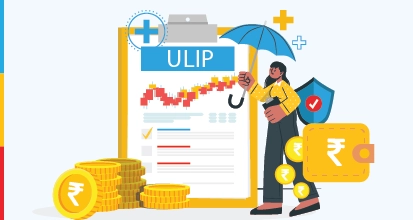Six Best One-Time Investment Plans in India
In case of investments, almost all instruments have a role to play depending on your expectations and goals. Time is one factor which determines which investment is best for you and which is not. Fortunately, there are investments like Unit-linked Insurance Plans that lets you segregate your investment amount into a variety of avenues, ensuring a balance of returns. Let's examine the table below to discover which one-time investment offerings are the best in India:
N/A
| Sr. No. | Types of One-time Investment Plans | Ideal Investment Period | Right Time to Invest | Tax Benefits On Investment Amount | Tax Benefits on Maturity Amount | Risk Factor |
|---|
| 1 | ULIPs | For tax benefits, wait 5 years.
For retirement planning, allow 10-15 years | Invest early to enjoy compounding benefits | Tax deductions u/s 80C of the IT Act | Tax benefits u/s 10(10D) of the IT Act | Medium to High |
| 2 | Equity Funds | 5 years and above
3 years for the ELSS Scheme | If you have extra money available for a long period of time | ELSS: Deductions under Sec 80C of the Income Tax Act
Other Funds: No tax benefits on investment | At the end of the 1-year holding period, tax benefits are available | High |
| 3 | Debt Funds | 3 years & more | Invests for less than 5 years
Tax implications are lower if you invest for more than 3 years | N/A | Indexation benefits on returns at the end of a 3-year holding period | Low |
| 4 | Liquid Funds | 3 years or less (if it's not a SIP) | If you have not yet decided on the best long-term investment plan in India | N/A | Holding for 3 years or more attracts lower taxes due to indexation benefits | Medium |
| 5 | Fixed Deposits (FD) | 7 days to 10 years
Depending on your investment horizon
| when you want to avoid market-volatility risks | N/A | N/A | Lowest |
| 6 | 5-Year Tax Saving FDs | Minimum 5 years to gain tax benefits | Extra funds can be used to reap the tax benefits of fixed returns | Tax benefits u/ deductions under 80C of the IT Act | Sec 10(10D) of the IT Act provides tax benefits on returns | Lowest |
| 7 | Public Provident Fund(PPF) | For a stable and high-returning corpus, 15 years is recommended | As a safe investment for the retirement period | Deductions under Section 80C of the Income Tax Act, 1961 | Tax-free returns | Lowest |
| 8 | Sukanya Samriddhi Yojana (SSY) | SSY account up to 21 years or until the girl child marries
| Providing tax benefits while creating a fund for the education of girls
| Tax deductions u/Section 80C of the IT Act, 1961
| Interest earned and Maturity amount is Tax-free | Lowest
|
| 9 | National Pension Scheme (NPS)
| Till the age of 60-70 years
| A one-time investment plan that creates a retirement fund and provides tax benefit
| Benefits under Section 80C and 80CCD of the Income Tax Act, 1961
| Taxable
| Low
|
1. Equity Funds
Equity funds are less risky alternatives to direct market investments, mostly because of the diversification and professional management involved.
If you are looking to save tax for the financial year under section 80C and want to invest in equity funds, invest in ELSS or Equity-Linked Savings Schemes. Equity-linked savings schemes are pure equity funds, but they give you a deduction of up to Rs 1.5 lakhs under section 80C.
- Ideal Investment Tenure: 5 years or more. ELSS will have a lock-in period of 3 years.p>
2. Debt Funds
There are many types of debt funds, but for your consideration, we are only accounting the ones investing in AAA and AA-rated corporate bonds or government securities.
These funds carry far lower risk from their securities composition than equity funds. Plus, you get the benefit of diverse securities in the fund. These funds also offer steadier returns but may suffer in terms of taxability.
So, the tax laws consider profit from debt fund investments a short-term capital gain if you withdraw within 36 months. The short-term capital gains increase your taxable income for the financial year and attract taxes at slab rates.
Learn: Long-term and Short-term Capital Gain.
However, if you stay invested for 36 months, your profits from debt funds will become long-term capital gains. Tax laws require the effect of inflation on long-term capital gains before estimating tax.
3. Liquid Funds
Liquid funds are among the most useful investment options. They are not the best when it comes to generating long-term returns. But these funds are best for saving your money from being spent while you decide on the best investment option.
Plus, minimal exit load means you can transfer your invested amount directly from the liquid funds to another fund. This simple option opens up huge opportunities for you to invest systematically. We will explore some of these opportunities here, but first:
4. Liquid Mutual Funds to ULIPs
ULIPs are very tax-efficient investments. That is, they give you deduction under 80C, and tax-free maturity value plus, multiple equity and debt fund options. ULIP may be the only instrument which allows you to invest in debt and liquid funds and still enjoy the same tax benefits.
However, tax benefits only last so far as your annual premium is less than 10% of the policy sum assured. So, if you want to invest Rs 10 lakhs in ULIP you will need a sum assured of Rs 1 crore. But that is only when you are investing Rs 10 lakhs all at once.
Instead, here’s what you can do using liquid funds as an alternative channel:
Channelling and automating your investment through the liquid fund will give you the following advantages:
Also, you defer your taxes on your investment in liquid funds as you spread your withdrawals over five years. With a ULIP plan you can invest in a mix of equity and debt funds and use dynamic portfolio management strategies. These strategies allow you to manage your portfolio automatically and exploit market opportunities without taking extra risks. Plus, ULIPs are a great investment option for long-term goals.
Also Read - How to Invest Money?
5. Liquid Mutual Fund to Equity Funds
Although equity funds carry lower risk than direct equity investments due to diversification, they are still volatile. That is why you should use a systematic approach to invest your money in equity funds. A systematic investment approach will help you benefit from rupee cost averaging in the volatile market.
If you are a regular investor or investing out of your regular income, you can easily create a systematic investment plan or SIP for investing in an equity fund. But, if you want to allocate your bonus income, you can do so with the following steps:
6. Liquid Mutual Funds to Other Investments
You can create similar investment plans out of liquid funds, such as to a deferred annuity plan, to NPS or PPF. If you are already operating an NPS tier-I account you can claim an additional deduction of Rs 50,000 over the 80C limit of Rs 1.5 lakhs.
Few other notable investments are senior citizen savings schemes which can be a gift for your parents. Also remember, every investment option has its reasons, ideal investment period and different risk-return level. So, make sure you go through all the plans to find the one which makes more sense to you.
Click here to use - Investment Calculator








